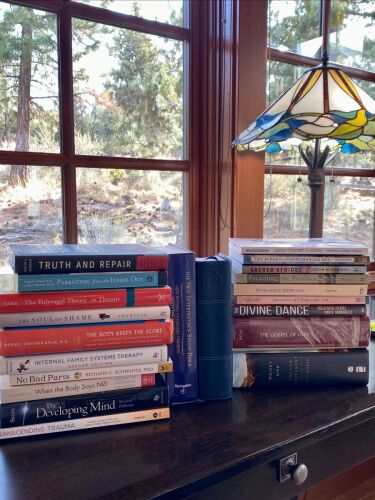 You know you’re beloved, but you don’t feel beloved.
You know you’re beloved, but you don’t feel beloved.
No matter how many times you return to favorite verses for reassurance, you have a nagging sense that God’s unconditional love does not extend to you. You believe it for others, but not consistently for yourself.
What’s blocking your ability to receive God’s love? To feel deeply, utterly beloved?
The answer to one of your most perplexing questions requires understanding yourself in a new way – understanding God’s design for you and understanding how life experiences shape you.
You are created in the image of God, who is multiple. Have you ever thought about what that means?
You, too, are (in a human, not God-like way) multiple. Personality tests such as the Enneagram or Myers-Briggs identify different characteristics and traits. And when you face a significant decision, you find yourself thinking, “Part of me wants to make this change, but another part of me is afraid of what might happen.” Sometimes you resonate with the words of the Apostle Paul: “I do not understand my own actions. For I do not do what I want, but I do the very thing I hate” (Romans 7:15, NRSV).
Understanding multiplicity helps make sense of your experience.
When you turn your attention inside, it does not take long to identify different (often conflicting) thoughts, emotions, sensations, and images. A psychotherapy model called Internal Family Systems (IFS) provides a lens to understand your multiplicity. You have an internal family with a variety of members! Stay with me and see if this makes sense to you.
The heart of the internal family system is you – your “true self,” “soul,” or, simply, “Self.” Ideally, you lead the inner family, drawing on resources reflecting God’s image. IFS identifies 8 “C” qualities: curiosity, calm, compassion, clarity, creativity, confidence, courage, and connection. This is not an exhaustive list of all of the ways you mirror God “who is love” (1 John 4:8), but it’s a helpful way to identify who’s present and leading the inner family.
You also have various internal family members who possess qualities, talents, and strengths that combine to create your uniqueness. Just as the Church is described as a body with many equally valuable parts (1 Corinthians 12:14-25), humans arrive in this world with a Self and diverse parts.
Then life happens.
Inevitably, everyone experiences adversity. Everyone is wounded to some degree because there are no perfect parents, and even the best of intentions sometimes do not have ideal results.
Wounding burdens parts of you with distorted beliefs, painful emotions, and distressing images and sensations. Wounds make you vulnerable; they are a threat to your well-being. So, some internal family members take on roles designed to protect you from being overwhelmed by pain. They are your “protectors.”
What does all this have to do with believing you’re beloved?
The (often young) wounded parts of you are the ones who believe things like, “I’m unlovable,” or “I’m not good enough.” They think it’s their fault terrible things happened, that they are defective. Until their wounds heal, you will struggle with fully accepting God’s gracious, unconditional love.
The path to healing begins with your protectors.
Protectors are afraid your pain will be overwhelming, so they need to trust you enough to allow you to connect with it.
Befriending your well-intentioned, dedicated protectors is an essential part of your healing. They often run the show, trying to control how others perceive you or attempting to numb the pain. When you turn towards them and say, “Hi, I’m here, and this is not all up to you,” they calm down. Spending time with them builds their trust. Eventually, they will point you to the wounded ones, and they will step back so you can connect with them.
Every part of you is either supporting you with wonderful qualities, well-intentioned and trying to protect you, or wounded and in need of loving-kindness.
Notice your heart as you see yourself in this way. Is love flowing from you to each eternally valuable part of you?
Perhaps there’s just a crack in the door to your heart, allowing just a bit more love to flow. Invite more of the Spirit to bathe you in the light of love. Imagine wrapping your arms around all parts of you, allowing the Spirit to flow through and around you.
Repeat after me: “I am beloved. All of me.”
Amen.
This post originally appeared on the Rev. Kyle Norman’s blog – https://revkylenorman.ca/




This is good! I love the way you blend research and the Bible here in ways that are sound and useful. Thanks for this!
Thank you, Monika! Happy to hear it’s helpful.